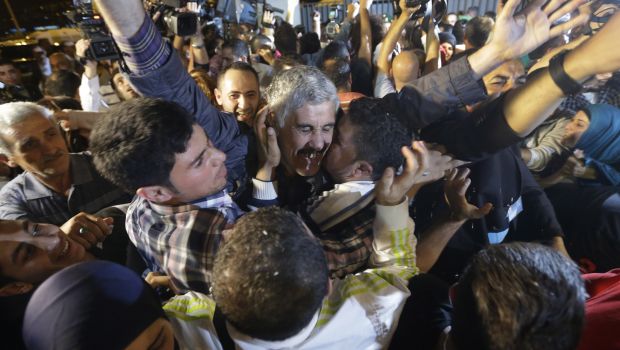
Abbas Hammoud, one of the nine Lebanese Shiite pilgrims who were kidnapped by a rebel faction in northern Syria in May 2012, is embraced by his relatives after his release, upon his arrival at Rafik Hariri international airport, in Beirut, Lebanon, Saturday, Oct. 19, 2013 (AP Photo/Hussein Malla)
The nine hostages, who were kidnapped by the opposition’s Northern Storm Brigade in Syria, arrived in Beirut late on Saturday on a flight from Istanbul, while a plane took the Turkish pilots back to Istanbul around the same time.
Hundreds of people converged on Rafik Hariri airport in Beirut to welcome the nine Lebanese hostages home. The hostages were also met by a number of officials, including Lebanese Foreign Minister Adnan Mansour and Interior Minister Marwan Charbel.
The deal which allowed the hostages to be freed also included the release of more than 100 female prisoners by the Syrian government. Reports said the North Storm Brigades also received EUR 100 million in the exchange deal.
Meanwhile, the case of two bishops kidnapped in Aleppo in April is still unresolved. UN High Commission for Refugees Middle East envoy Ali Aqil Khalil, however, said the two bishops, Boulos Yaziji and Yohanna Ibrahim, were expected to be released within the next two weeks.
Information received in the last few days indicates progress has been made in securing their release. The emir of Qatar, Sheikh Tamim bin-Hamad bin-Khalifah Al Thani, has promised to follow up the case personally, while Lebanon’s head of public security, Gen. Abbas Ibrahim, was in charge for the Lebanese side, shuttling between Turkey, Qatar and Syria to finalize the deal to release the two clerics.
In another development, the Palestinian Authority’s Foreign Ministry on Saturday released a statement which said it had mediated between the Syrian government’s armed forces and the rebel Free Syrian Army (FSA), to facilitate the exchange of the hostages.
The statement said “Palestinian early intervention facilitated the idea of the exchange of prisoners by both the FSA and the regular Syrian army, especially the release of the Lebanese hostages held by Syrian opposition fighting brigades in exchange for the release of women prisoners held by the regular Syrian army.”
Meanwhile, Lebanese Parliament Speaker Nabiih Berri thanked Qatar for its important contribution to the deal and also thanked Palestinian President Mahmoud Abbas for his efforts. He also praised Turkey’s role in responding positively to the efforts and contributing to the transfer of the Lebanese hostages to Turkey and facilitating their return.
Berri said: “We thank Syria for responding at the highest level to all demands to resolve this issue in a way which saved the lives of the Lebanese hostages, and leading to their release.”
For his part, former prime minister and head of the Future Movement Saad Al-Hariri congratulated the Lebanese people and the families of the hostages on the success of the efforts to release them. He expressed his hope that this process would form “a step on the road to end the suffering of many prisoners and detainees, and for efforts to succeed in releasing bishops Boulos Yaziji and Yohanna Ibrahim.”
He also praised “the noble efforts by the state of Qatar and the Turkish government, as well as the efforts of the head of public security, Gen Abbas Ibrahim.”
